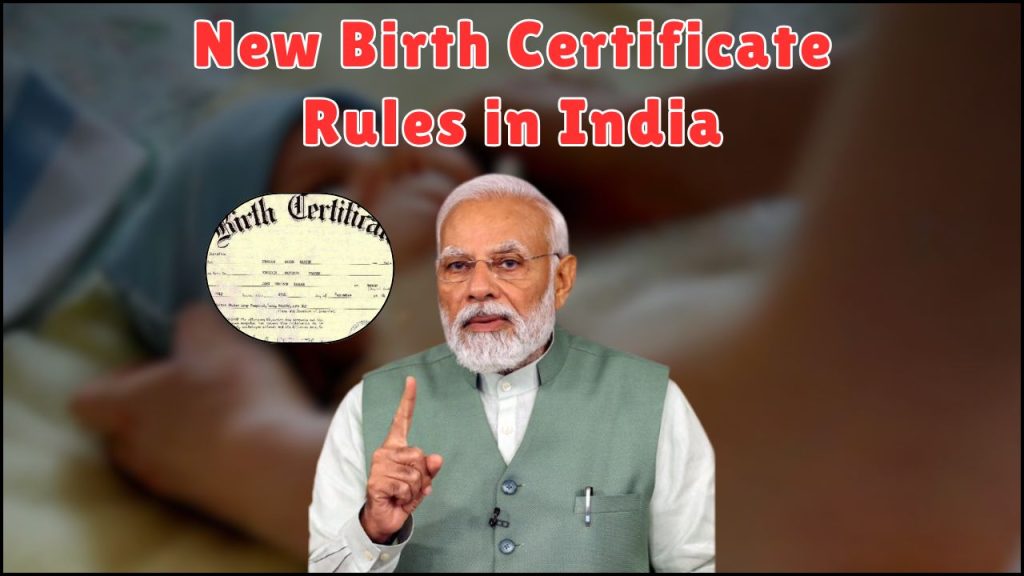
India’s administrative landscape is undergoing a revolutionary transformation with the introduction of comprehensive new birth certificate rules that will fundamentally change how citizens interact with government services. Following the Registration of Births and Deaths (Amendment) Act, 2023, these groundbreaking reforms establish the birth certificate as the singular, authoritative document for verifying date and place of birth across all official platforms. Every Indian parent, citizen, and family must understand these pivotal changes that promise to streamline bureaucracy while creating new responsibilities and opportunities.
The “One Nation, One Birth Certificate” initiative represents the most significant overhaul of civil registration in India’s modern history. This comprehensive digital transformation affects everyone from newborn parents to senior citizens seeking government services, making it crucial for every Indian to understand the implications and take necessary action to ensure compliance with the new framework.
The Revolutionary “One Nation, One Birth Certificate” Framework
The cornerstone of these reforms is the ambitious “One Nation, One Birth Certificate” initiative, designed to eliminate the chaos of multiple documentation requirements that have long plagued Indian citizens. Under this unified system, a single birth certificate will serve as the primary proof of birth details for numerous essential services, ending the frustrating cycle of obtaining multiple verifications through different government channels.
The government has mandated that all state administrations integrate their civil registration systems with the Centre’s unified database, creating a seamless digital ecosystem for identity verification. This integration ensures real-time access to birth records, dramatically reducing processing times for various applications and eliminating the geographical constraints that have historically complicated documentation processes.
This transformation means that a birth certificate issued in Kerala will be instantly verifiable in Delhi, Punjab, or any other state, creating unprecedented mobility and convenience for Indian families who relocate for education, employment, or other opportunities.
Expanded Scope: Services Now Requiring Birth Certificates
The new regulations have significantly expanded the scope of services that mandate birth certificate verification, making this document more critical than ever before in Indian civic life.
| Service Category | Specific Requirements | Previous Documentation |
|---|---|---|
| Educational Services | School admissions, college enrollment, scholarship applications | School leaving certificates, TC |
| Identity Documents | Voter ID registration, Aadhaar enrollment, driving license | Multiple local proofs |
| Travel Documentation | Passport issuance, visa applications | Birth affidavits, school records |
| Employment | Government job applications, formal sector employment | Various age proofs |
| Legal Services | Marriage registration, property inheritance | Local registrar documents |
| Financial Services | Bank account opening, insurance policies | Multiple identity proofs |
This expanded mandate transforms the birth certificate from a document used occasionally to one that citizens will need throughout their lives for accessing essential services. The change particularly affects families with children, as educational institutions now require birth certificates for all admissions processes.
Digital Application Process: Step-by-Step Guide
The government has established a streamlined digital application process that represents a dramatic improvement over the traditional bureaucratic maze that citizens previously navigated.
| Application Step | Process Details | Timeline |
|---|---|---|
| Online Registration | Visit state civil registration website and create account | 5-10 minutes |
| Application Completion | Fill detailed form with personal and family information | 15-20 minutes |
| Document Upload | Submit supporting documents (hospital records, parent ID) | 10-15 minutes |
| Verification Process | Automated and manual verification by authorities | 7-15 days |
| Status Tracking | Real-time updates via SMS and email notifications | Ongoing |
| Certificate Download | Digital certificate with QR code and security features | Instant upon approval |
| Integration Verification | Automatic linking with other government databases | 24-48 hours |
For new parents, the process has been revolutionized with hospitals now directly uploading birth data into the central system. This eliminates the traditional burden of visiting municipal offices and submitting multiple documents, allowing families to focus on welcoming their newborns rather than navigating bureaucratic procedures.
Impact Analysis: Different Citizen Groups
New Parents and Young Families
The reforms bring transformative benefits to new parents who have historically struggled with complex registration processes. Hospital-to-system direct uploads mean that birth registration happens automatically, with digital certificates available within days rather than weeks or months. This streamlined process enables faster enrollment in healthcare schemes, educational pre-registration, and other essential services that benefit young families.
Adults Without Existing Birth Certificates
For the significant population of adults who never received formal birth certificates or have lost their documents, these reforms create both urgency and opportunity. The new system makes it essential to obtain proper documentation, but the digital framework also makes the process more accessible than ever before.
Non-Resident Indians and Internal Migrants
The digital framework offers unprecedented advantages for NRIs and internal migrants who have traditionally faced challenges verifying their birth details across different jurisdictions. Birth certificates can now be verified globally, eliminating geographical constraints and reducing the documentation burden for Indians living abroad or relocating within the country.
Senior Citizens and Pensioners
Older citizens who may have outdated or incomplete birth documentation now have streamlined pathways to update their records, which is particularly important for accessing pension benefits, healthcare services, and other age-related government programs.
Comprehensive Benefits of the Reformed System
The transition to this unified digital system delivers substantial advantages that address long-standing citizen pain points while modernizing India’s administrative infrastructure.
| Benefit Category | Specific Advantages | Citizen Impact |
|---|---|---|
| Documentation Efficiency | Single document serves multiple purposes | Reduced paperwork burden |
| Security Enhancement | Centralized verification reduces fraud risks | Greater document authenticity |
| Processing Speed | Digital verification accelerates applications | Faster service delivery |
| Geographic Flexibility | Access records from anywhere in India or abroad | Improved mobility |
| Transparency | Clear verification pathways and status tracking | Enhanced accountability |
| Cost Reduction | Elimination of multiple document fees | Financial savings for families |
These improvements represent a fundamental shift from reactive bureaucracy to proactive digital governance that prioritizes citizen convenience while maintaining security and accuracy standards.
System Comparison: Old vs. New Framework
Understanding the transformation requires examining the dramatic differences between traditional and reformed systems.
| Aspect | Previous System | New Digital System |
|---|---|---|
| Verification Method | Manual processing requiring multiple documents | Single digital document verification |
| Data Management | Localized at municipal bodies with limited connectivity | Centralized database with real-time access |
| Service Integration | Limited applications and poor inter-department coordination | Fully integrated across all government platforms |
| Accessibility | Physical copies required for all transactions | Digital access with instant verification |
| Fraud Prevention | Vulnerable to manual errors and document forgery | Enhanced security through centralized verification |
| Geographic Scope | Limited to issuing jurisdiction | Valid across entire nation and internationally |
Action Plan for Citizens Without Birth Certificates
If you currently lack a birth certificate, immediate action is essential to avoid service disruptions and take advantage of new opportunities.
Immediate Steps:
- Gather all available supporting documents including hospital discharge papers, school certificates, vaccination records, or family documents
- Visit your municipal office or access your state’s online civil registration portal
- Submit a delayed registration application with comprehensive supporting evidence
- Track application status using the provided reference number
- Once approved, download and verify your digital certificate integration across platforms
Supporting Documentation Options:
- Hospital birth records or discharge summaries
- School leaving certificates or academic transcripts
- Vaccination certificates or health records
- Family ration cards or voter lists
- Religious ceremony records
- Affidavits from family members or community leaders
Verification and Digital Status Checking
Citizens can easily verify whether their birth certificate has been digitized under the new system through a simple online process:
- Visit the Office of the Registrar General of India (ORGI) website or your state’s civil registration portal
- Navigate to the birth certificate verification section
- Enter required details including full name, date of birth, place of birth, and parent information
- The system will immediately indicate digital database status
- If available, download your digitized certificate with security features
- If unavailable, follow prompts to initiate digitization process
Future Implications and Digital Governance Vision
These birth certificate reforms represent a foundational element of India’s broader digital transformation strategy that aims to create seamless, efficient, and transparent governance. The changes establish a model for other documentation reforms and demonstrate the government’s commitment to reducing bureaucratic barriers while enhancing security and accessibility.
The success of this initiative will likely influence similar reforms for other essential documents including death certificates, marriage registrations, and property records. This comprehensive approach promises to create an integrated digital identity ecosystem that simplifies citizen interactions with government services while maintaining robust security standards.
Conclusion: Embracing the Digital Future
The new birth certificate rules represent a watershed moment in Indian administrative history, offering citizens unprecedented convenience while establishing modern governance standards. Every Indian parent and citizen must understand these changes and take proactive steps to ensure their documentation complies with the new framework.
Whether you’re registering a newborn, updating your records, or planning future government service interactions, embracing these reforms will secure smoother access to essential services while supporting India’s vision of efficient digital governance. The transformation from paper-based bureaucracy to digital excellence requires citizen participation and awareness—making this knowledge essential for every Indian family’s future success.
Take immediate action to verify your birth certificate status and ensure your family is prepared for this new era of streamlined, secure, and accessible government services.
Frequently Asked Questions
Q: Do I need to get a new birth certificate if I already have one issued before these new rules? A: Not necessarily. Your existing birth certificate remains valid, but you should verify if it has been digitized in the new system by checking the official portal. If not digitized, you may need to apply for integration into the digital database to access the full benefits of the new system across all government services.
Q: How long does it take to get a birth certificate under the new digital system? A: For new births with hospital direct upload, digital certificates are typically available within 7-15 days. For delayed registrations or adults applying for the first time, the process can take 15-30 days depending on document verification requirements and state-specific processing times.
Q: What should I do if my birth details have errors in the new digital system? A: You can apply for corrections through the same online portal used for new applications. Submit supporting documents that prove the correct information, such as hospital records, school certificates, or official family documents. The correction process typically takes 15-21 days once proper documentation is provided.
Q: Can I use the digital birth certificate for international purposes like visa applications? A: Yes, the new digital birth certificates are designed to meet international standards with security features like QR codes and digital signatures. However, some countries may still require additional authentication or apostille certification, so check specific requirements with the relevant embassy or consulate before travel.














The more you commit, the harder they laugh — pluscomedy.com